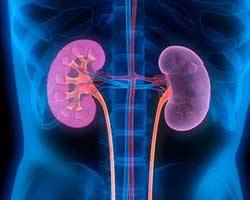
| Report Category | Indication Pipeline Reports |
AKI or acute kidney failure is a condition which occurs due to sudden injury in kidneys and results in the minor or complete loss of their function. The causes of AKI can be divided into three categories: prerenal, intrinsic, and postrenal.

| Report Category | Indication Pipeline Reports |
Polycystic kidney disease (PKD) is a genetic disease that causes cysts to develop in kidney. These cysts are filled with fluid and lead to enlargement of kidney and subsequent loss of its functioning, which eventually causes kidney failure.

| Report Category | Mechanism of Action Reports |
Mitochondria (singular: mitochondrion) are cytoplasmic organelles found in eukaryotic cells, such as plants, animals, fungi, and protists. The number of mitochondria present in a eukaryotic cell depend on the metabolic requirements of that cell; and ranges from a single large mitochondrion to thousands of the organelles.

| Report Category | Competitive Landscape Reports |
IgA nephropathy, also known as Berger’s disease, is a kidney disorder that occurs when IgA antibody gets settled in kidneys. This leads to inflammation that with time hinder kidney’s ability to filter waste from blood. IgA nephropathy is the key source for Glomerulonephritis, where the functional unit of the kidney, that filters blood gets inflamed.

| Report Category | Mechanism of Action Reports |
Epidermal growth factor receptors (EGFR) are a group of receptor tyrosine kinase (RTK) that plays a major role in cell proliferation, survival and differentiation. In most of the cancer, EGFR are amplified and overexpressed, due to dysregulation, resulting in cancer development.

| Report Category | Mechanism of Action Reports |
Endothelin antagonists are drug candidates that acts against endothelin receptors and generate pharmacological actions such as blocking the vasoconstriction and mediate vasodilatation. Endothelin-1 is a peptide which is comprised of 21 amino acids and formed by vascular endothelium.

| Report Category | Mechanism of Action Reports |
Interleukin receptors are a group of cytokine receptors that are expressed by leukocytes. Interleukin receptors play an important role in the functioning of the immune system.

| Report Category | Mechanism of Action Reports |
Hepatocyte growth factor (HGF) is secreted by human pancreatic stellate cells and present predominantly on cancer cells. Thus, HGF inhibitors has emerged as an effective therapy in preventing local tumor growth.

| Report Category | Mechanism of Action Reports |
RNA interference (RNAi) is a molecule type that silences the gene and limits the transcription of the mutated gene. Gene silencing is a novel mechanism that inactivates the transcripts of mutated gene, by activating sequence specific RNA degradation process.

| Report Category | Mechanism of Action Reports |
Rho kinase inhibitor, also known as ROCK inhibitor, inhibits the rho kinases, a family of small GTP-binding protein. Rho kinases are found to regulate cell motility, proliferation, shape, gene expression, apoptosis, and are also involved in the signalling pathway.

| Report Category | Mechanism of Action Reports |
Cyclophilin befits in the group of protein that shows peptidyl-prolyl cis-trans isomerase activity, found in all types of cells. In humans, 16 cyclophilins have been identified till date. Cyclophilin A, a member of cyclophilin group, mediate the action of immunosuppressive drugs.

| Report Category | Mechanism of Action Reports |
Cell cycle inhibitors include cyclin inhibitors and cyclin-dependent kinases (CDKs), which plays major role in developing new class of anti-cancer therapies. Also, cell cycle inhibitors in combination with chemotherapy, overcome drug resistance and improve cytotoxic efficacy. CDKs are rational targets for cancer treatment, that could restore cell-cycle checkpoints and may induce apoptosis.

| Report Category | Mechanism of Action Reports |
Angiopoietin (ANG) receptor plays a crucial role in regulation of vascular permeability and pathological vascular remodelling during tumour angiogenesis, metastasis and inflammation. Thus, it has emerged as a new clinical approach for the development of therapeutics which treat cancer and ophthalmological diseases.

| Report Category | Mechanism of Action Reports |
Adenosine 5-monophosphate activated protein kinase (AMPK) plays an important role in regulation of homeostasis. Dysregulation of AMPK can result in many diseases which includes obesity and type 2 diabetes. Several studies have also suggested that AMPK are also associated with the development of neurological diseases and cancer.

| Report Category | Mechanism of Action Reports |
Alpha-synuclein is a protein that is abundantly found in the brain. The minimal amount of alpha-synuclein is also found in the heart and other tissues. The protein is prominently found at the tips of the nerve cells. It helps in the maintaining supply of the synaptic vesicle in presynaptic terminals. In addition, the alpha-synuclein protein also helps in release of dopamine.

| Report Category | Mechanism of Action Reports |
Akt, also known as PKB, is generally activated in several types of cancers such as breast, gastric, lung, ovary, and pancreatic cancer. Akt inhibitor prevent the functioning of activated form of Akt kinases. Akt kinases are also involved in promoting growth factor-mediated cells that mediates cell proliferation and inhibition of apoptosis through the inactivation of pro-apoptotic proteins, such as mouse double minute 2 homolog (MDM2) and Bcl-2 antagonist of cell death.

| Report Category | Indication Pipeline Reports |
Lewy body dementia is a progressive brain disorder in which Lewy bodies build up in different parts of the brain that regulate cognition, movement and behavior. Lewy bodies are abnormal deposition of a protein called alpha-synuclein.

| Report Category | Indication Pipeline Reports |
Von Hippel-Lindau syndrome is a genetic disorder characterized by formation of cysts and tumors in different parts of the body. The symptoms associated with the disease depends upon the location of tumor.

| Report Category | Indication Pipeline Reports |
Focal segmental glomerulosclerosis (FSGS) is a glomerular disease, which is characterized by scarring or sclerosis in the kidney. Scarring damages the limited number of glomeruli in the initial stages. It is more common in males than in females, and is very common in African American population.